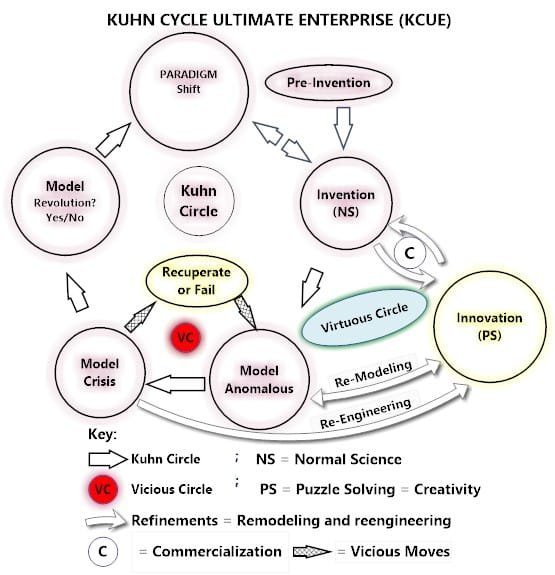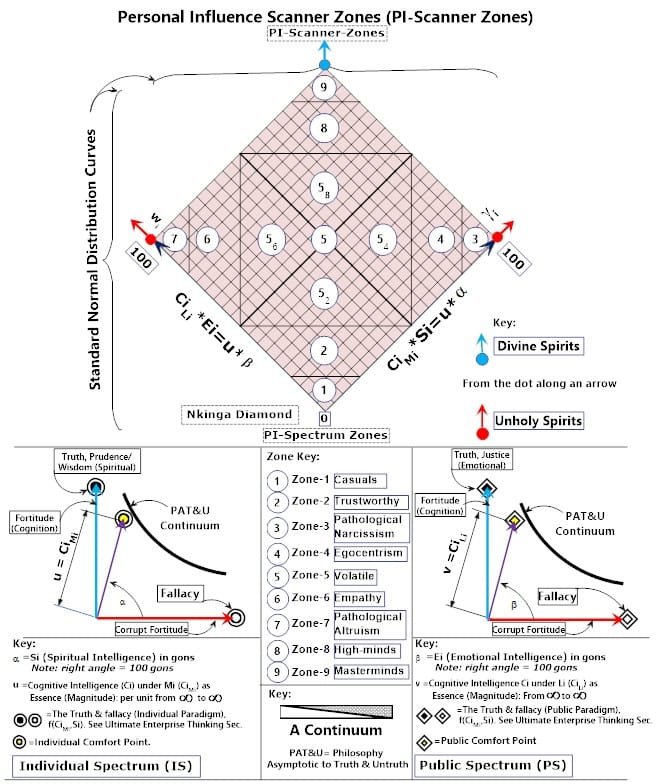The term “resource curse” was introduced by Richard Auty in 1993 after his research revealed a perplexing trend: resource-rich nations often suffer economically and socially instead of benefiting from their natural wealth. These countries seem trapped in a perpetual cycle of mismanagement and hardship, leading Auty to label this phenomenon a “curse.” According to the Merriam-Webster dictionary, a curse is “a prayer or invocation for harm or injury to come upon one.” However, in this case, no external harm is needed—the curse comes from within—this is the truth.
This paradox is more than just misfortune; it stems from a fundamental absence of truth. It reflects the gap between potential and reality, between what should be a blessing and what becomes a burden.
A Curse, a lack of Truth Illustrations
Figure 1: Kuhn-Cycle Ultimate Enterprise (KCUE)
Kuhn Cycle Ultimate Enterprise (KCUE) expands the Kuhn Cycle by introducing two additional periods. The first, between normal science (invention) and model drift (anomalous), is called innovation (puzzle solving or creation). The second, between model drift and model crises, is termed recuperation (or fail).
From these additions, two key cycles emerge: the virtuous cycle (Vir-cycle) and the vicious cycle (V-cycle). The Vir-Cycle results from PUER management, while the V-Cycle stems from CUER. Each cycle follows distinct loops; a loop in the V-cycle, if governed by the Vir-cycle, becomes an incumbent retard. Implementing a Vir-Cycle loop within the V-Cycle renders it inoperable, indicating that an incumbent remains in the V-Cycle. A V-cycle organization can ascend to a Vir-cycle through two opportunities: transitioning from model anomalous to re-model towards Vir-cycle or re-engineering during model crises.

Figure 2: PI-Scanner Zones
Nkinga Diamond comprises zones conducive to decision-making, delineating PUER (Pro Ultimate Enterprise Region) with zones 1, 2, 5, 8, and 9, and CUER (Contra Ultimate Enterprise) consisting of zones 3, 4, 6, and 7. Additionally, Nkinga Diamond features two marks: divine spirits located beyond zone 9 (symbolizing ideal beings). Apart from zone 7—home to entities transcending altruism—demonic entities reside in zone 3, which signifies those surpassing narcissistic tendencies.
The details of the PI-Zones are found here.

The Resource Curse and the Lack of Truth
At its core, the resource curse exposes a deeper issue: a failure of leadership, governance, and societal values to align with truth and justice. It manifests through:
- Ownership Conflicts: Rivalries over control of natural resources lead to personal gain over collective benefit.
- Corruption: abuse of power and embezzlement of resource revenues undermine economic stability.
- Vicious Cycle Traps: Persistent mismanagement prevents nations from escaping cycles of decline.
- Dutch Disease: Over-reliance on resources harms other economic sectors, leading to stagnation.
These issues perpetuate fallacies that prevent resource-rich nations from achieving prosperity, as seen in resource-poor countries like Japan, South Korea, and Singapore, which have thrived by embracing innovation and truth-based governance.
Truth as the Antidote
Truth is not just an abstract ideal; it is a practical necessity. Leadership that prioritizes honesty, transparency, and moral intelligence can transform the resource curse into a blessing. However, achieving this requires breaking free from the vicious cycles of corruption and mismanagement.
The Kuhn-Cycle Ultimate Enterprise (KCUE) framework illustrates how organizations can transition from vicious to virtuous cycles by embracing innovation and re-engineering processes. Similarly, the PI-Scanner Zones help identify personal and public influences that align with truth or fallacy, offering a roadmap for change.
Conclusion
Resource abundance is not inherently a curse; it becomes one in the absence of truth. Effective leadership rooted in truth can turn resources into a powerful driver of prosperity and development.
As history shows, resource-poor nations have succeeded where resource-rich nations falter—not because of their wealth but because of their adherence to truth and sound governance.
“The truth is the lifeblood of the world’s well-being.”
The resource curse is not a curse; it is a lack of truth. Leadership must recognize this to break free from cycles of poverty and mismanagement.
